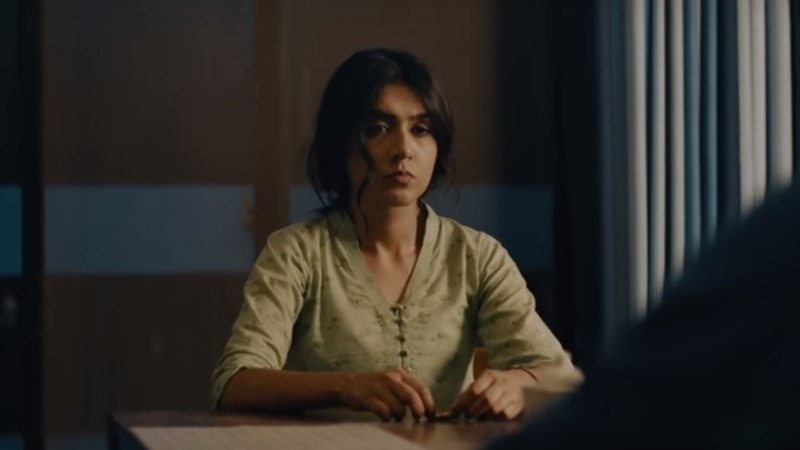In Laal Kabootar we finally have a movie that equals Karachi's chaos and glory
Smack in the middle of a tense moment in director Kamal Khan's debut film Laal Kabootar, female lead Mansha Pasha looks costar Ahmed Ali Akbar in the eye and says: "I'm not one of those people who just runs away."
The line is a nod to a familiar critique that Pakistanis toss at each other: that when times get rough, it's in our national character to look for the nearest escape. The accusation cuts across class lines; the elite are taunted for their global mobility which they rely on as a buffer between themselves and the harsher realities of daily life in Pakistan. The average citizen, in turn, is accused of retreating into apathy.
This critique is not baseless, and for that reason many Pakistani films that've come before Laal Kabootar have used the opposing trope of the 'heroic young person striving for change against all odds' to power their narratives. After all, when all we're surrounded by is yes-men there's something compelling about a changemaker, a naysayer.
But an over-reliance on heroism and grandiosity in Pakistani cinema has started wearing on me. Overtly patriotic film like Parwaz Hai Junoon and Sherdil lack emotional depth for their heavy-handedness. And some films, like Shoaib Mansoor's Verna, exaggerated the heroism of their main leads so dramatically, all that remained was a caricature of bravery, entirely unrelatable.
Laal Kabootar has to walk a knife's edge between these two impulses: to stir up hopeful bravery on one hand, and on the other, to raise a mirror to an urban landscape (Karachi) so harsh that navigating it can often feel hopeless.
I'm happy to tell you the film succeeds.
A diverse cast of Karachiites, neatly connected

Laal Kabootar introduces us to Aliya Malik (Mansha Pasha) and her journalist husband Noman Malik (Ali Kazmi). After Noman is killed in broad daylight on a busy Karachi street by gunmen in what Aliya is convinced is a target killing, she devotes most of her energy to finding his murderer. She hounds the police, where she crosses paths with hulking, corrupt and utterly unhelpful Inspector Ibrahim (Rashid Farooqi). She relentlessly follows leads, mostly working alone because everyone around her has retreated into aforementioned apathy.
Meanwhile, deep in the winding lanes of a dense Karachi neighbourhood, Adeel (Ahmed Ali Akbar) tends to his aging father, drives a little red cab to make ends meet, commits petty theft and dreams of saving enough money to escape to the promised land: Dubai.
Aliya and Adeel's individual scheming and planning throws them together unexpectedly. Adeel offers to help Aliya find her husband's murderer. In exchange, she'll give him enough money to flee to the UAE. Sounds simple enough... but neither of them realise they're in over their heads.
What follows is threats and torment and fear, gunfights and death, difficult choices and the potential unmasking of a corrupt empire.
Laal Kabootar has many strengths, and one of them is its neatly plotted script. Even though the script juggles multiple story arcs, by the film's end I could count no discernible plot holes, a rare feat for desi cinema. Screenwriter Ali Abbas Naqvi has proved himself skilled at setting the stage for believable action without over-explaining the moment. At the same time, each character's journey is treated with respect and consideration. No character's development is sidelined in favour of the other, each one is rendered complex, human and relatable.
Laal Kabootar is incredibly well-cast. It depends on lesser-known acting talent to flesh out its ranks, proving that big names don't necessarily equal good films.
These are characters that will stay with you long after the theater empties out. Laal Kabootar's band of wilful Karachi-wallahs are consistently surprising: just when you've written off one character as an evil scumbag he'll surprise you by committing a random act of kindness. I wanted very badly to hate Inspector Ibrahim, and when he tortures a hapless informant in the thaana I almost did. But who can hate a man who dotes on his daughter so much he lets her paint his face despite his machismo?
Of course, these characters couldn't have come to life without exceptional acting. Laal Kabootar is incredibly well-cast. It depends on lesser-known acting talent to flesh out its ranks, proving that big names don't necessarily equal good films. Each actor, from the creepy assassin (Saleem Meraj) to Adeel's hapless father (Akbar Islam), shines.
Mansha Pasha and Ahmed Ali Akbar are A-plus. Mansha plays Aliya with great restraint, which is on point: a Pakistani woman navigating male spaces must be, by force of circumstance, restrained. Always calculating costs, keeping herself together even if internally she's falling apart.
Ahmed Ali Akbar brings a grit and authenticity that is equal to what Karachi's streets demand of men. I can't imagine anyone else playing these roles.
Karachi finally comes to life in Laal Kabootar

A balanced combination of close, claustrophobic shots and panoramic sweeps establishes the varied versions of Karachi that each character lives daily. But even that's a very clinical description of the film's overall vibe, which is best described as deeply atmospheric.
The film feels authentic because it refuses to sanitise Karachi: every garbage dump is on display, the grime on polluted walls is evident, the suffocation of Adeel's tiny bathroom feels palpable.
Authenticity is achieved by locating the city's undisguised preoccupation with money — earning it, losing it, stealing it — as a central theme and plot point.
The film also refuses to sanitise the character of those who inhabit Karachi, and they're shown to us exactly as they are: smart-talking, wise-cracking, scheming, quick to anger but also quick to help. Class differentials are shown without softness or sentimentality, and the rigidity of class barriers is obvious too. The often bleak, wretched, hopeless existence of low-wage earners is on full display.
Authenticity is also achieved by locating the city's undisguised preoccupation with money — earning it, losing it, stealing it — as a central theme and plot point.
Most of local cinema I've watched so far tends to isolate its characters from the wider world, which fictionalises the experience far too much. Laal Kabootar does the opposite, pushing its characters into the sort of mundane interactions with fellow commuters, policemen or street vendors that you or I might engage in on the daily. The effect is one of total immersion: the world that *Laal Kabootar creates feels undeniably real.
In light of all this, what prevents the film from feeling too much like a documentary is the slight but necessary exaggeration of each character's guts and capabilities. In Laal Kabootar, where us regular folk would run away from danger, the film's character's run toward it. Not out of over-inflated ego or a false sense of bravery, but out of either desperation, loyalty or even madness.
It's this low-level exceptionalism that kept me hooked and rooting for everyone onscreen.
A note on love's place in Laal Kabootar

Is Laal Kabootar a love story? Overtly, no, for there is no 'active' love connection in the film.
I would argue that this absence of a real-time romantic courtship is one of the film's greatest strengths. Avoiding a focus on frivolous cinematic signifiers of love like rain-drenched embraces allows less obvious, more complex forms of love to dominate Laal Kabootar: like the love that exists between Aliya and the memory of her husband. After all, it is love that motivates Aliya's search for Noman's murderer. It is love that doesn't allow her to accept his loss or become apathetic.
Adeel's self-love is an act of great courage, a triumph of spirit over condition. He holds his life in high enough esteem to want to change his circumstances.
Adeel is also motivated by love. Sometimes it's love for his father, but mostly... it's love for himself. He holds his life in high enough esteem to want to change his circumstances. He believes he is better than the cards he's been dealt would have him think. And for that he is deeply admirable. His self-love is an act of great courage, a triumph of spirit over condition.
In this way Laal Kabootar somewhat resembles another exceptional Pakistani film: Cake. Both films are ostensibly 'about' subjects other than love, yet they provoke a sense in that love is bigger, vaster and more transformational than any other emotion out there.
Could the film have done anything differently?
Laal Kabootar is that rare film where its latter half is tighter and more cohesive than its former. In contemporary Pakistani cinema films tend to start strong and unravel rapidly towards their close. But Laal Kabootar only gets better.
This could've been rectified by establishing characters faster, eliminating some establishing shots and condensing others. But these are smalls criticisms for a film that gets mostly everything right, from the soundtrack to the casting to every subtle emotional nuance.
Watch it, it's worth it.
Laal Kabootar is in cinemas today.












Comments